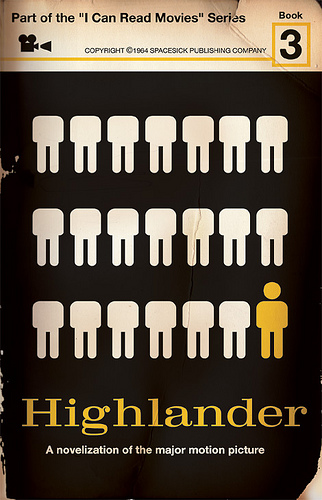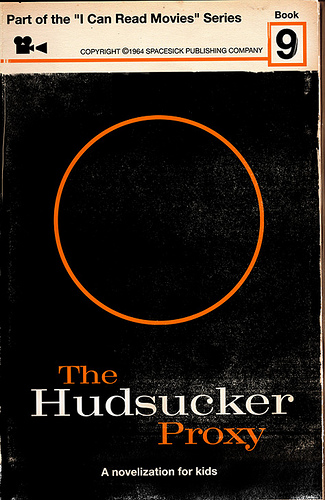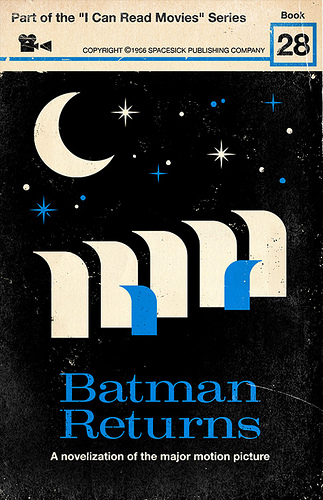Hey, Perseus: Cloverfield called — they want their Kraken back. The Avatar trailer bounty continues with another 300-ish trailer for Louis Leterrier’s Clash of the Titans remake, with Sam Worthington, Liam Neeson, Pete Postlethwaite, Ralph Fiennes, Gemma Arterton, Mads Mikkelsen, Jason Flemyng, and Alexa Davalos. Eh, ok. They’re still angling too hard for the meathead demographic imho, but at least they lost that embarrassing “Titans will Clash! tagline from the last go-round.
Tag: Cinema
Mind the Whiplash.
And another late arrival in today’s trailer bin, which will also presumably be featured before Avatar tomorrow night: The Stark family past catches up to Tony (Robert Downey Jr.) in the teaser for Jon Favreau’s eagerly-anticipated Iron Man 2, also with Gwyneth Paltrow, Don Cheadle (replacing Terrence Howard as Rhodey), Scarlett Johansson, Sam Rockwell (blink and you’ll miss him), Samuel L. Jackson, Garry Shandling, and Mickey Rourke. Yes, they made a sequel to the movie about the trailer…From a fanboy perspective, I’m still thinking Johannson is badly miscast as the Black Widow. Otherwise, this looks like more of the same — Count me in.
Prince of Thieves, Queen of Hearts.
In the trailer bin, Russell Crowe grunts, growls, and generally looks very Maximus-ish in the new trailer for Ridley Scott’s Robin Hood, also with William Hurt, Mark Strong, Max von Sydow, Oscar Isaac, and Cate Blanchett (nee Sienna Miller) as Maid Marian. And two colorful new trailers for Disney’s Alice in Wonderland suggest Tim Burton might have gone pretty far afield from the original Lewis Carroll tome, and that Johnny Depp might get Willy Wonka-annoying here after awhile.
Update: But does he know the street value of that mountain? It’s The Hangover meets Back to the Future as John Cusack, Rob Corddry, Craig Robinson, and Clark Duke travel back to 1986 in a Hot Tub Time Machine, also with Lizzy Caplan, Crispin Glover, and Chevy Chase. Um, yeah.
99 Reels of Film on the Wall…
Apologies for the quietness ’round here the past week. Aside from work obligations, I’ve actually been putting together a verrrrry long post on the top 100 movies of the Oughts (2000-2009), which will go up in installments (along with the usual best-of-2009 list) sometime between now and the new year. At the very least, I can’t go to print with it until after tomorrow at midnight…
Stuck Inside of Mobile.
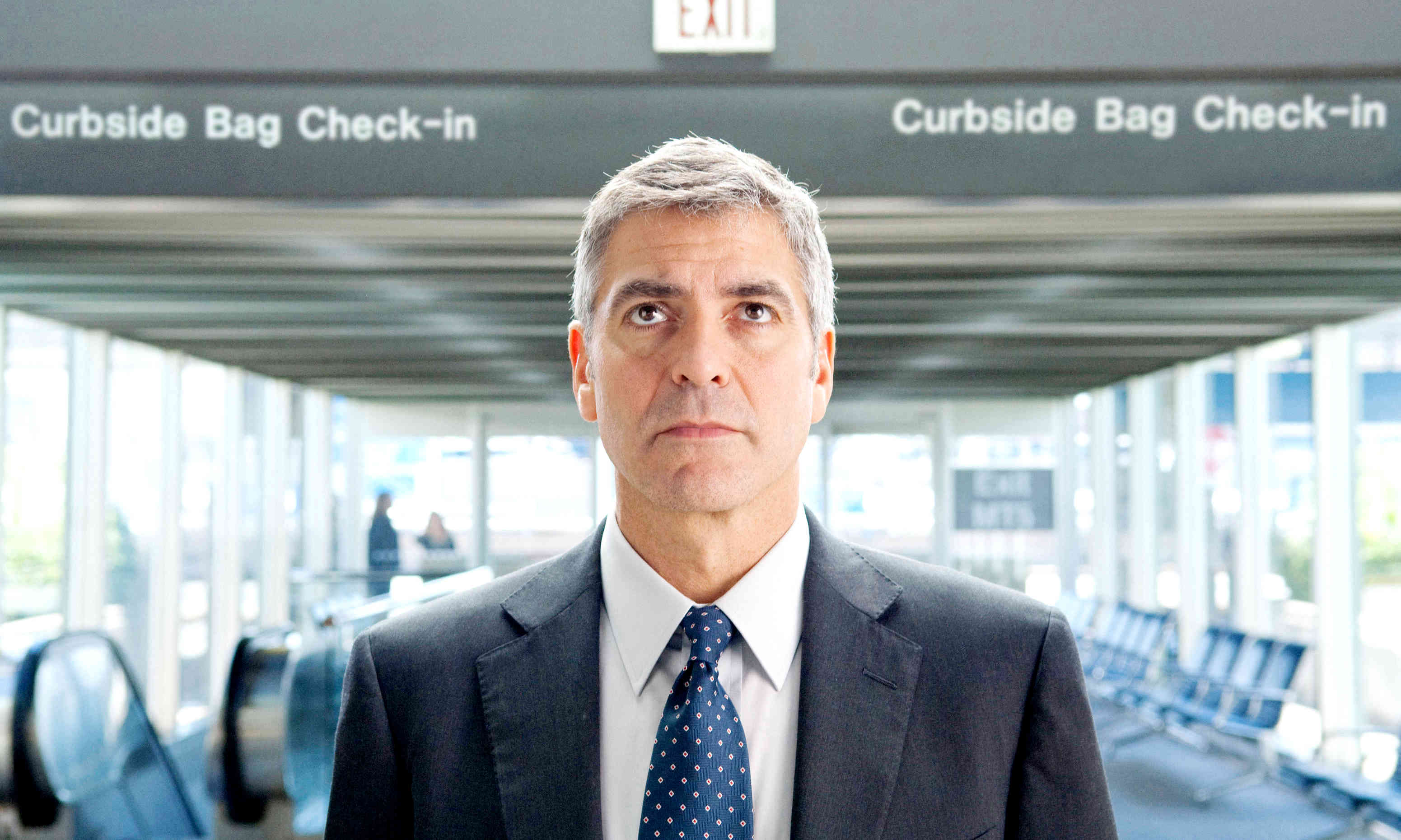
Sure, constant work-related jetsetting may have hastened Tyler Durden’s descent into borderline psychosis in Fight Club. But, if you need a second opinion, airports are the sea in which George Clooney thrives in Jason Reitman’s well-made but disappointing Up in the Air. I found it hard to pin down exactly why this movie bugged me at first, until I thought more about that memorable rant from Fight Club: “Everywhere I travel, tiny life. Single-serving sugar, single-serving cream, single pat of butter. The microwave Cordon Bleu hobby kit. Shampoo-conditioner combos, sample-packaged mouthwash, tiny bars of soap. The people I meet on each flight? They’re single-serving friends.“
And Up in the Air? It’s a single-serving movie, albeit one you might get in business class — glib, pre-packaged, wrapped in plastic, and, alas, not as tasty, nutritious, or filling as it looks. (After coming to this realization, I discovered Stephanie Zacharek felt much the same: “The picture is brushed with a fine glaze of slickness, a product sealed in a blister pack. It’s like airplane air — it has a packaged freshness that isn’t really fresh at all.“) Sure, from moment-to-moment Up in the Air is engaging enough, but sadly it all adds up to the less than the sum of its parts. (And I have a sinking feeling the Oscar of Crash, Million Dollar Baby, and Slumdog Millionaire will love it.)
Even notwithstanding an 11th hour jag that makes for a more satisfying landing than I originally suspected, there’s a lot of rote here: the obligatory wedding scene, the standard-issue epiphany in the middle of a public speech, the in vino veritas, letting-the-hair-down night among co-workers (set to not-so-Young-anymore MC); the Elliott Smith-scored nostalgic reminiscences of those days gone by, etc. etc. Up in the Air is impressively made and a Quality Production™ through-and-through, but it’s also over-stylized and curiously hollow, and it too often feels like a movie conceived by a marketing department. Imho, it needed more of that ragged, hand-crafted, DIY flair that marked the other two recent Clooney flicks this year, The Men Who Stare at Goats.
To give credit where it’s due, Up in the Air does boast one of the more memorable credit sequences I’ve seen in recent years — lovely aerial shots of the American landscape, set to a funked-up version of Woody Guthrie’s “This Land is Your Land” (by Sharon Jones and the Dap Kings.) But things get gloomy pretty quickly thereafter, with — ripped from the headlines! — a lot of people like you and me finding out that they’ve been given the axe. (Reitman apparently put out ads in Detroit and St. Louis looking for recently laid-off folks — It’s as close to home-spun as Up gets.)
Anyway, holding the handle is Ryan Bingham (Clooney): A professional firer by trade (when he’s not giving motivational speeches on the side), Bingham spends his days breaking employees the bad news so their bosses don’t have to. This job keeps him on the road pretty much constantly…which is fine by Bingham — he’s an Airportman, never happier than when he’s lounging at the American Airways VIP club, or checking into a hotel for a layover, or cruising at 50,000 feet above the heartland. (In his defense, he does live in Omaha — would you want to go home? Also, his travel experiences generally seem a lot less shoddy than almost all of the ones I can remember, but perhaps that’s a function of the miles.) In short, for Bingham transition is bliss: He’s a ship always at sea, never reaching port, and being a million miles from home only means he’s got nine million more to go.
But, naturally, new forces threaten Bingham’s airline Eden. Perhaps most importantly, his squirrelly boss (Jason Bateman) has recently made a hire out of Cornell — Natalie Keener (Anna Kendrick) — and she has the bright idea to start firing people over the Internets — Thus, no more endless junket. (To which I say, good idea! If I were getting fired either way, I don’t see how having smug-ole-George Clooney hand me a packet in person is going to improve my mood about it.) For another, his little sister (Melanie Lynskey) is getting married (Danny McBride), and their honeymoon plans (and the nagging family responsibilities they confer) make it harder for Bingham to pack light, as is his wont. And confusing the situation further, Bingham meets his female counterpart in Alex (Vera Farmiga), an eye-catching gal who shares a fondness for traveling constantly and in luxury. Does all of this mean it’s time for Ryan to put down some roots and live like the rest of us, or has he had the right idea all along?
In my Best of 2006 list, I said of Reitman’s amiable but botched take on Thank You for Smoking that “[w]hat Smoking needed was the misanthropic jolt and sense of purpose of 2005’s Lord of War, a much more successful muckraking satire…But Smoking, like its protagonist, just wants to be liked, and never truly commits to its agenda.” Well, Up in the Air has the same sense about it. I haven’t read the Walter Kirn novel this is based on, but I’m willing to bet Bingham probably comes across as more of a jerk therein. It sometimes seems that the sharp edges of this tale — “fly the unfriendly skies” and whatnot — have been filed off here. Similarly, I don’t want to give away the ending, which you deserve to experience unspoiled after sitting through the interminable high-school-nostalgia and wedding scenes. But it also feels a bit like Reitman flinched from the material in the end, or even that the finish we get isn’t the one he’d have liked to be building to.
I’m probably being harder on this film than it deserves, but if I was complaining about Cormac McCarthy’s relentless misanthropy just the other day, Up in the Air veered too far for me in the other direction. As in Reitman’s Juno, everyone’s likable and well-meaning perhaps to a fault, even when they’re acting horribly. And, when things go south, well there’s always some sugary-sweet, anesthetizing indie ballad that can soothe the pain and take you to commercial. It’s a sales job Bingham would be proud of.
Jefferson, I Think We’re Lost.
By way of AICN, most of Team Sexy Beast (Ray Winstone, Ian McShane, the writers) conspire with the venerable John Hurt and most of Team John Adams (Tom Wilkinson, Stephen Dillane) in the new trailer for Malcolm Venville’s cockney crime story 44 Inch Chest, also with Joanne Whalley. With that pedigree and cast, count me in.
Takin’ That Ride to Nowhere.
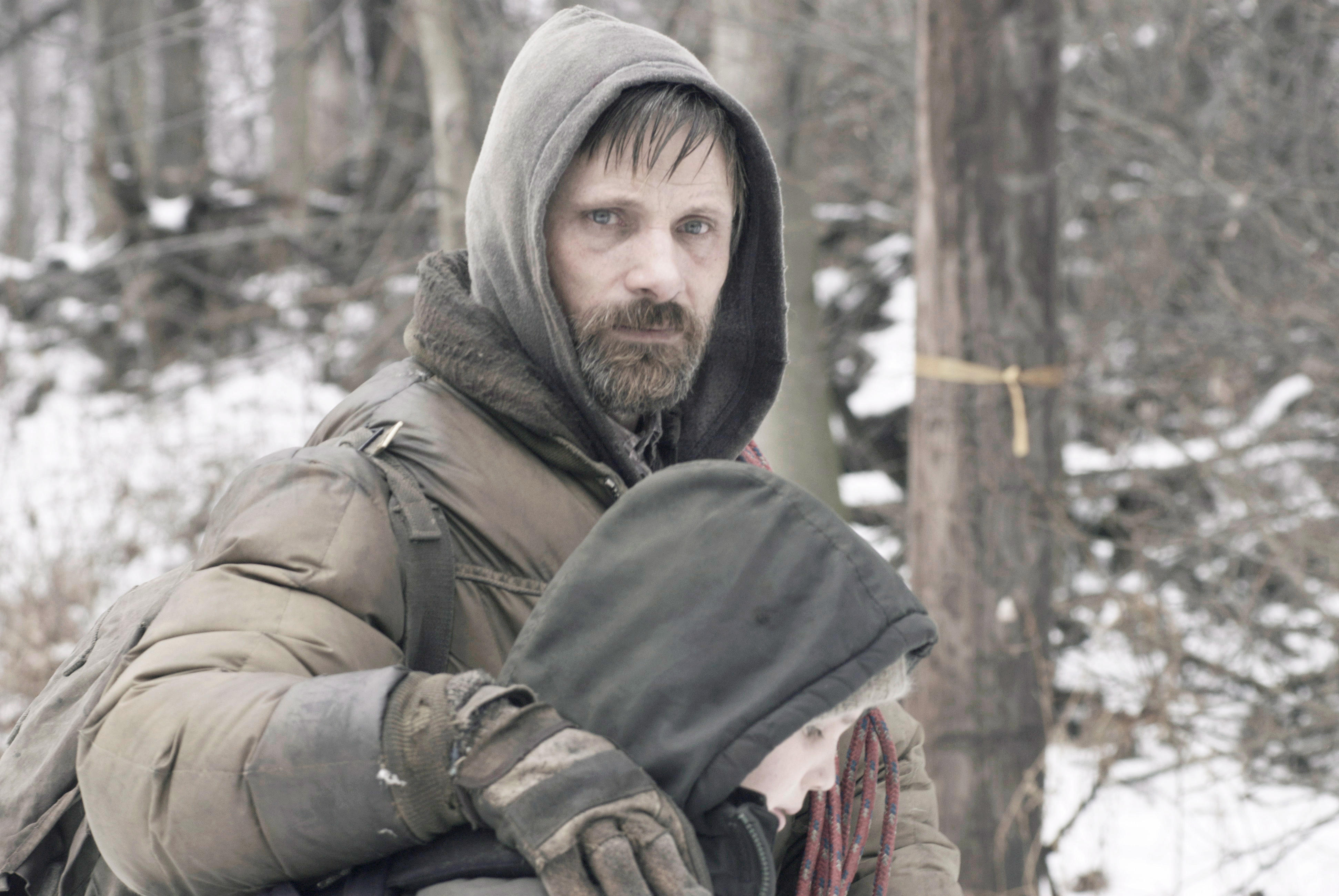
And so the Man sighed. For it was Thanksgiving, a good time to repent. To forgive, even, and be forgiven. (But, no, ye will not be forgiven, not in this lifetime, nor the next.) And so the Man sighed again. And with that sigh that carried a whiff of the Old West and better, simpler times when Men were Men and were good with their hands and knew the old tongues, he leaned to his Sister (for it was Thanksgiving) and said, wearily, “Ok, The Fantastic Mr. Fox was pretty solid. Let’s go hit up The Road.” And so they went, into that ash gray, charcoal black in-between, where violent men prowl and shriek and beg for forgiveness (it will not come), and the good dreams cough up their last.
Or something like that. I wouldn’t say Cormac McCarthy is a bad writer, because he quite obviously isn’t. (Tho’ Salon‘s Stephanie Zacharek does seem to have his number.) But his voice, and his penchant for wallowing in He-Man pretension, definitely don’t speak to me, and my enjoyment of the Coens’ No Country for Old Men notwithstanding, I tend to find his books significantly overpraised. I’ve heard people call Blood Meridian the best American novel since Moby Dick. But, personally, I found it overwrought and tedious, and I put it down in boredom after 150 pages of meticulously detailed vignettes involving blood spatter, entrails, scalps and the like. (Of course, your mileage may vary.)
That was also my sense going into John Hillcoat’s adaptation of McCarthy’s The Road. As post-apocalyptic sci-fi goes, I thought the book was a solid foray into the genre, and I thought it a well-done, if very depressing, beach read. But I was a bit surprised to find it heralded thereafter as a Big Important Book, when, to my mind, it didn’t seem any more or less deserving of acclaim than, say, On the Beach or Alas, Babylon or The Death of Grass or The Stand or (probably my fave of the bunch) A Canticle for Leibowitz. As I said here, “I thought The Road was post-apocalyptic sci-fi for people who normally condescend to the genre, and thus haven’t read/seen very much of it.”
If I’ve gone on at length here about my thoughts about the book rather than John Hillcoat’s movie, it’s because Hillcoat’s film version felt more than most adaptations like its source material, with all of its strengths and weaknesses. The Road is not as moody, evocative, and weirdly twisted as Hillcoat’s The Proposition, a movie I caught on Netflix and for several weeks thereafter felt like I had dreamed. But it does set a strong and consistent tone, even if that tone is one of grim, monochromatic despair. And, while it’s hard not to conjure visions of Aragorn of the Dunedain when a scruffy Viggo Mortensen leads a small child ’round the wilderness, he’s pretty good in the part, and it’s hard to think of very many other actors who could have pulled it off as well. (Although Guy Pearce makes his case as a contender for the role, late in this film.)
If you haven’t read the book, basically it is the near future — let’s say 2013, after John Cusack and co. have dipped out on their arks — the End has come and gone, and the tattered remnants of mankind have been cast back into the primeval wild. Through this bleak and battered valley of the shadow walks a Man (Hobo Viggo) and his Child (Kodi Smit-McPhee, also quite good.) Unlike so many other of the remaining survivors, they forego cannibalism and scrounge to survive, with the Man remembering the good old days and the Boy sweetly, perhaps mercifully, oblivious of life before the Fall. And so, bereft of the Woman (Charlize Theron) in their life — she took the quick ticket out — they traverse south, hoping that a new, better life might await them somewhere along the coast.
And that’s about it, really. Our father and son run into various HBO all-stars along the way (Garrett Dillahunt of Deadwood is still a skeez, and, even amid the ruins of human civilization, Omar comin‘! (Michael Williams)). And they encounter Robert Duvall, who damn near walks away with the film in a jaw-droppingly good cameo. For my part, the movie conjured up a few new questions for me (why isn’t anybody using bicycles?) to go along with the ones I still carried from the book (why would you ever leave that bomb shelter?) But, it’s basically The Road, filmed. For better or worse, it has that’s book’s melancholy soul, its occasional moments of horror, and its grim sense of inevitability and cynicism about the last days of Man.
Now, I personally happen to think there’d be a bit more banding together and ad-hoc families created a la Zombieland and, I hate to say it, 2012, than the blistering, relentless pessimism in evidence here. But I suppose McCarthy would just argue I’m flinching in the face of God’s indifference to our plight. Eh, we’ll manage. You may think Man has no sense of decency, sir, but don’t worry — It’s alright, baby, it’s alright.
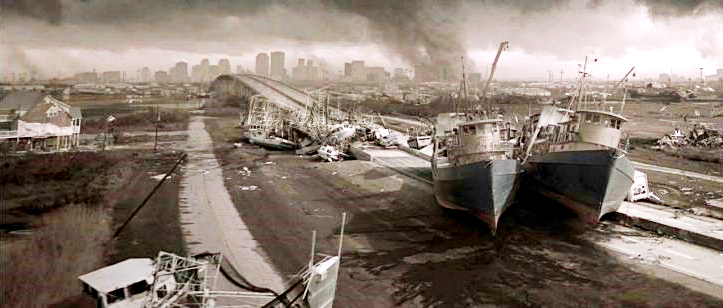
The Life Vulpine.
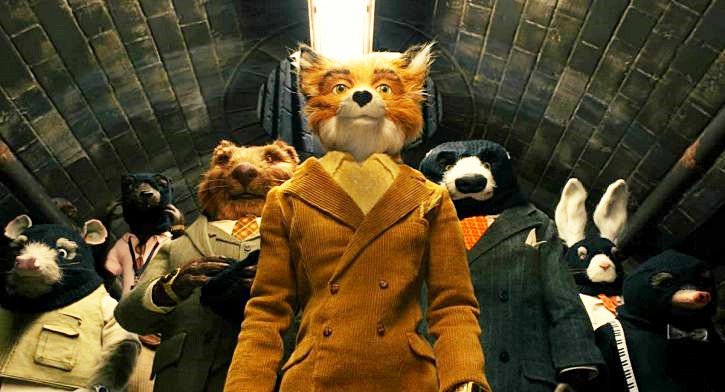
Just so you’re warned, the usual and persistent Wes Andersonisms are on full display here — the bric-a-brac, dollhouse fustiness of the shots, the extended (animal) family, the soundtrack of classic-pop standards, the Rushmore-like whining about identity and acceptance. (We even have Jason Schwartzman, Bill Murray, and another train set.) Yet, all of this seems so much more palatable when focused on a dapper Vulpes vulpes and his coterie of animal companions. The bad habits and forced idiosyncrasy I found irritating in, say, The Life Aquatic, somehow go down much more smoothly when presented as the normal day-to-day behavior of stick-like animals. Go figure.
As you might expect, The Fantastic Mr. Fox begins with a Roald Dahl nursery rhyme (“Boggus, Bunce, and Bean, one short, one fat, one lean“), followed by the introduction of our eponymous beast (Clooney) — He’s dressed to the nines and looking to impress his sweetie (Meryl Streep) with a courtly stroll and a daring raid on a henhouse. But the raid goes awry (or, if you prefer the animal vernacular, gets all cussed up), which is just as well since Ms. Fox turns out to be in a family way, and Mr. Fox should probably settle down and find a safer line of work if he’s gonna live long enough to see the kits grow up.
Many fox-years later, Fox now has a teenage son named Ash (Schwartzman) and a steady and well-paying job working as a newspaper columnist. (Hey, it’s a fantasy — suspend your disbelief.) But the old wild animal urges are still brewing in Mr. Fox…or is it just a mid-life crisis? In any case, Fox up and buys a tree, and — with his bashful new ‘possum super Kylie (Wally Wolodarsky) and his inordinately talented nephew Kristofferson (Eric Anderson) as accomplices — he surreptitiously returns to a life of henhouse crime. This is much to the consternation of the local robber barons, Boggus, Bunce, and particularly Bean (Michael Gambon), the brains of the operations, who decide to take drastic action against their thieving new neighbor. It’s all fun and games until somebody loses a tail…
The central plotline here basically follows the Roald Dahl book, which I had dim childhood memories of going in and which came roaring back as the story unfolded (the shot-off tail, for example.) But, as with Where the Wild Things Are, there needed to be more here to make a full-length movie, and so Wes Anderson and co-writer Noah Baumbach (also director of The Squid and the Whale and Margot at the Wedding) went to their wheelhouse: mid-life ennui (Fox feeling old a la Bernard Berkman), family turmoil (Ash hates living in the shadow of his cousin), high school angst (Ash is lousy at whackbat (the local pastime) and his cute lab partner ignores him), etc. etc. And there are times when all of these additions threaten to start dragging everything down — I myself could have done with one or two fewer toasts by our titular hero near the end.
But, unlike Jonze and Eggers with Where the Wild Things Are, Anderson and Baumbach seem to remember that ultimately this is a kid’s story, and that, at the end of the day, The Fantastic Mr. Fox should mostly just be a whimsical tale. So, every time the movie seems like it’s about to drown in interminable Wes-isms, along comes some curliciue crazy-eyes, or a foam-flecked rabid dog, or a cider-swilling rat (Willem DeFoe), or Bean wryly calling in air support. Rather than losing itself in arthouse ambition like WTWTA, The Fantastic Mr. Fox instead takes pleasure in its impeccable stop-motion craftmanship. And, at its best moments, even despite its occasional hipster pretensions, Fox manages to convey the simple but profound pleasures of a timeless fable well told.
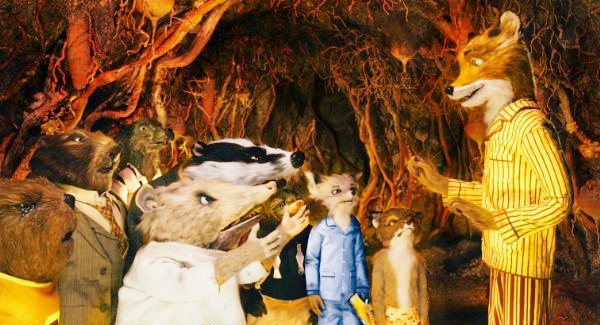
Fear and Loathing in New Orleans.
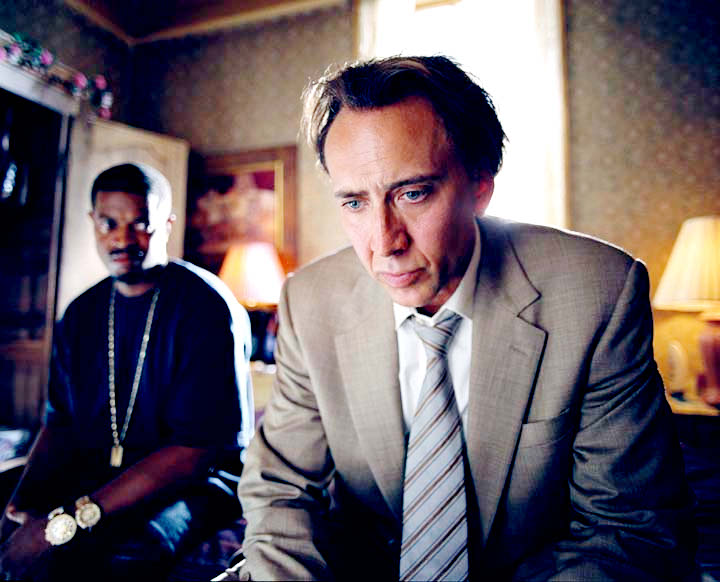
Partly a Chandleresque crime movie in the key of Southern Gothic (it made for a great counterpoint to my weekend immersion into L4D2, which also takes place in the Quarter), and theoretically a remake of Abel Ferrara’s tortured Harvey Keitel vehicle of 1992, Bad Lieutenant: Port of Call New Orleans is a dark acidhead comedy that’s much more freewheeling and enjoyable than I expected going in. And, rather than get bogged down and belabored by the arch-Catholic, sin-and-redemption motifs of the Ferrara version, Herzog and Cage mostly just groove along here to a trippy gonzo beat. The good Doctor‘s soul is still dancing.
After a swimming snake sets the stage for the proceedings, Bad Lieutenant: Port of Call New Orleans begins with, and mostly centers around, the shady escapades of one Lt. Terence McDonagh (Cage, more on him in a bit.) Ostensibly some of the Big Easy’s, uh, finest, McDonagh and his partner (Val Kilmer, not given much to do) are surveying the mid-Katrina wreckage of their precinct when McDonagh figures out that someone is locked in the flooding underground jail. They go downstairs, find this poor, trapped prisoner, and proceed to heckle him and make sidebets on his unlikely survival. But, eventually — and for reasons that seem unclear even to himself — McDonagh jumps into the murky, fetid waters to save the guy. And since no good deed goes unpunished, he is repaid with a excruciatingly painful back injury that puts him on Vicodin for the rest of his life. Well, that and a promotion.
Cut to six months later, and now-Lieutenant McDonagh finds himself with a new lurch in his step, several high-maintenance addictions to feed, and a big case brewing — the execution-style murder of five Senegali immigrants, including two small children. The cops have a pretty good sense of who the prime suspect probably should be: the local drug kingpin, Big Fate (Xzibit). But they have nothing to pin on him, and neither his two lieutenants nor anybody else seem to be talking. And in fact, McDonagh doesn’t particularly seem to care about the case — he’s too busy with his extracurriculars, which include but are not limited to: garnering choice illegal drugs by means foul or fouler, getting in way too deep with his long-suffering bookie (Brad Dourif), and/or keeping his hooker girlfriend Frankie (Eva Mendes) in the style to which she’s accustomed. Still, amidst all the lines of coke and the freebasing, something’s nagging at him lately — is that a pang of conscience struggling to break free, or is he just fiending for another massive hit?
Y’know, it’s easy to playa-hate on Nicholas Cage, and I’ve been known to indulge in it myself. And it’s true that, on account of his well-publicized money problems, the guy will appear in just about anything, from PG-ish family-fare (National Treasure, which I actually enjoyed) to slapdash genre pics (Knowing, Ghost Rider, Bangkok Dangerous) to out-and-out crap (LaBute’s Wicker Man travesty.) Still, his wild, weirdly hypnotic performance here in Bad Lieutenant reminds us that he’s also an exceedingly rare bird, and he’s given us more than his fair share of quality turns in the past, from Raising Arizona and Wild at Heart to Adaptation and Lord of War. (Not to mention his tour de force in Werewolf Women of the S.S.) Say what you will about the man, but from Vampire’s Kiss to Leaving Las Vegas to this flick, he’s not afraid to let it all hang out.
Of course, it helps to be aided and abetted in your crazy-man schtick by none other than Werner Herzog, who knows a thing or two about certifiably nutso leading men. (See also: Grizzly Man.) A lot of reviews seem to argue that this movie has absolutely nothing to do with Abel Ferrara’s Bad Lieutenant, but that’s only half true — A lot of the plot points remain the same: the carnal appetites, the grotesque abuse of power for sexual ends, the losing gambling streak, the conscience-tugging case despite it all. Where the difference lies, and why the films seem completely distinct, is in the valence of the tale. Ferrara’s movie (and Keitel’s performance) is grim, haunted with Catholic remorse and self-loathing, and, frankly, not much fun at all. But Herzog’s film, even in the most decadent parts, abstains from judgment, or even seems vaguely bemused by all the sordidness. (Also, fwiw, Herzog has replaced all the Biblical allusions of Ferrara’s movie with Cajun voodoo and animal/nativist spirits.)
Simply put, Bad Lieutenant: Port of Call New Orleans is clearly a film made by a man who’s comfortable with teh crazy. And, rather than condemn all the druggy depravities on display here, Herzog keeps a light touch, and usually just lets them unfold without much editorial comment. As our dear late Hunter Thompson put it on his own drug-inspired binge, “Buy the ticket, take the ride.”
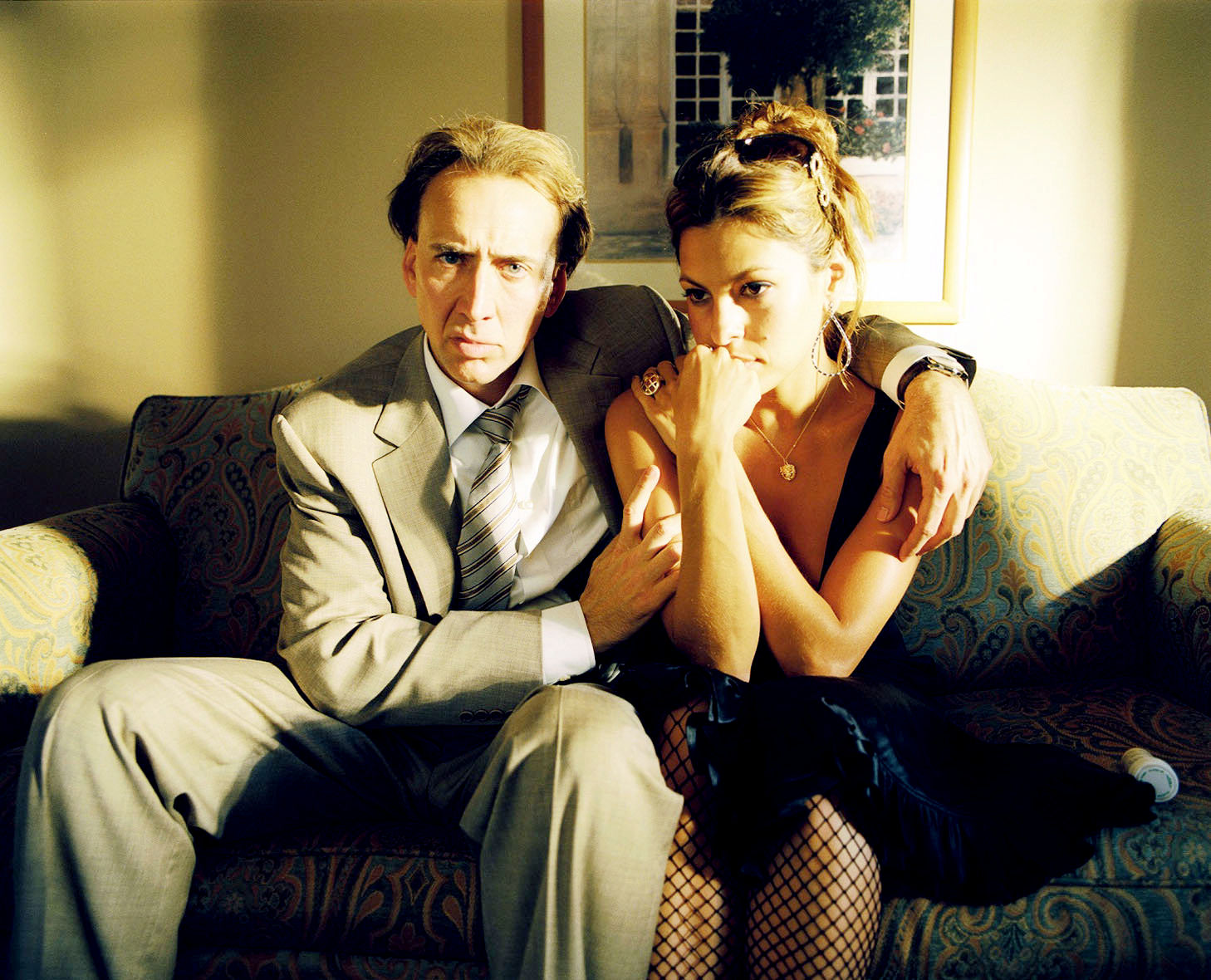
Swinging Serials.
